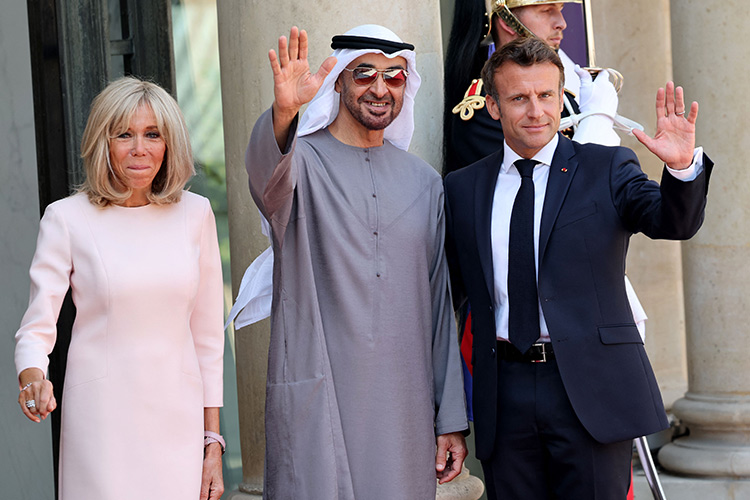France floats $8.8 billion plan to produce clean energy vehicles

Emmanuel Macron (left) visits Valeo’s factory in Etaples near Le Touquet, northern France, on Tuesday. Reuters
French President Emmanuel Macron announced an 8 billion euro ($8.8 billion) plan to make France the top producer of clean energy vehicles in Europe and urged French carmakers to make vehicles in their own country.
French car plants are only just starting to rev up production after the coronavirus lockdown, which hit the auto sector badly, and Macron wants to accelerate the transition to electric cars to help revive the industry.
“We need a motivational goal: make France Europe’s top producer of clean vehicles by bringing output up to more than one million electric and hybrid cars per year over the next five years,” Macron told a news conference on Tuesday.
To achieve that goal, he said France would increase the state bonus for consumers buying electric cars to 7,000 euros ($7,690) from 6,000 euros.
But to help dealerships sell the 400,000 vehicles left unsold because of the lockdown, Macron said people buying a traditional car would also receive a 3,000-euro bonus under a scheme that would apply to three-quarters of households.
“Our fellow citizens need to buy more vehicles, and in particular clean ones. Not in two, five or 10 years - now,” Macron said following a visit to a Valeo car parts factory in northern France.
No car model currently produced in France should be manufactured abroad, he said.
Valeo is a French global automotive supplier headquartered in France, listed on the Paris Stock Exchange. It supplies a wide range of products to automakers and the aftermarket. The group employs 113,600 people in 33 countries worldwide. It has 186 production plants, 59 R&D centres and 15 distribution platforms.
Renault, which produces its Zoe electric model in France, had pledged to make a future Renault-Nissan electric engine in France and not in Asia, as initially envisaged, he said.
The government will not sign off on a planned 5 billion euro state loan for Renault until management and unions conclude talks over the carmaker’s French workforce and plants in France, Macron said.
France was Europe’s top producer of electric and hybrid cars in 2019, with almost 240,000 vehicles, but IHS data show it is set to be overtaken this year by Germany.
Meanwhile, France’s economy is on course to contract 20% in the second quarter from the previous three months as the country emerges from a nationwide coronavirus lockdown, the INSEE official statistics agency estimated on Wednesday.
That would mark a sharp deterioration in France’s recession after the eurozone’s second-biggest economy contracted 5.8% in the first quarter.
INSEE said the economy could contract 8% for the whole of 2020 in the unlikely scenario that activity returned to pre-crisis levels by July.
INSEE estimated that France’s economic activity was running at 21% below normal levels after the lockdown in place from mid-March was lifted on May 11. Activity was down 33% in early May.
Consumer spending was only 6% below normal levels since most stores were allowed to re-open after nearly two months, a sharp improvement from the 33% seen in early May.
A monthly survey from INSEE showed consumer confidence continued to weaken in May, falling to its lowest level since January 2019 when the country was in the grip of anti-government protests.
Households’ concerns about the general economy remained in May at levels unseen since the survey began in 1972, while unemployment fears were the highest since the global financial crisis in 2009.
Business confidence improved from record lows reached in April, but remained at deeply depressed levels, a separate monthly survey from INSEE showed.
France said on Tuesday a European Union (EU) recovery fund to help countries deal with the economic impact of the coronavirus crisis should not be an excuse for fiscally conservative countries to demand cuts to the bloc’s long-term budget.
France and Germany have proposed to their EU partners the creation of a 500-billion euro ($550-billion) recovery fund made up of grants that would be paid to their hardest-hit regions.
It was opposed by four countries who call themselves the ‘Frugals’ - Austria, Sweden, Denmark and the Netherlands - and want a loans-based approach instead.
The debate about the recovery fund comes at a time EU countries are also negotiating the bloc’s long-term budget, its so-called “multi-annual financial framework” (MFF), which the ‘Frugals’ were also trying to reduce.
Reuters







